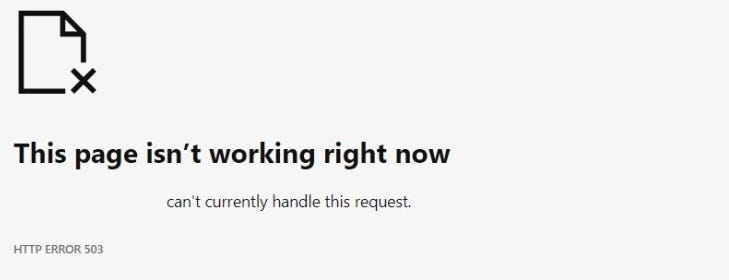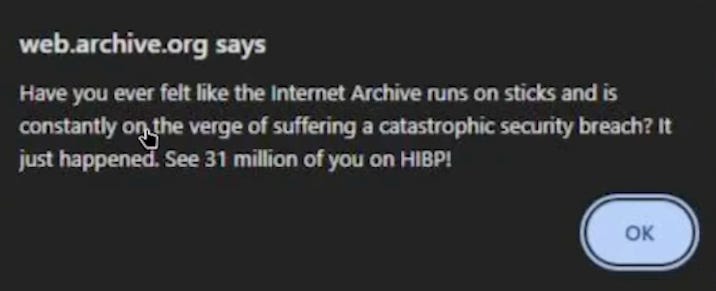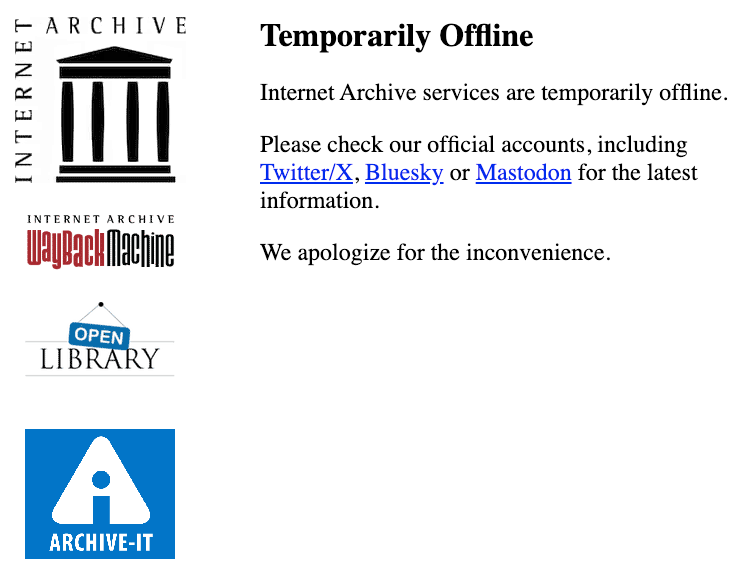It’s October 12th, 2024. The following article has been written in response to the multiple DDOS attacks and password leaks from The Internet Archive (IA, Archive.org, The Wayback Machine, Open Library, Archive-It) that have happened this week. To me, the IA is one of the most significant and important resources for preservation, and I’m not just talking about the Internet or modern times --I mean in all of time.
As an avid user of and contributor to Archive.org, I’d like to discuss the recent cyberattacks.
The IA is everything I, as a preservationist, digitizer, and hobbyist historian could ever possibly want from an online record of media and knowledge. It contains as much as the community puts into it, and the community surrounding the IA is beautiful and massive.
Later in this article, we will discuss how as many as 31 million passwords have been leaked from the IA’s servers. Please bare in mind that an IA account is not required to access the billions of uploads on the IA’s servers, only to upload your own media and use some of the more advanced features (library access, etc).
Many of you reading this right now have viewed something I’ve posted on there, as I’ve used it as the main hosting platform for my archived videos since 2023. This insane number of passwords that were leaked shows just how incredible the community of the IA is. 31 million people who have taken the time to upload or document something they felt important. I am one of these people.
This year has already been a hard time for Archive.org. Early September, the Open Library operated by the IA took a huge hit in court.
Last week, the Internet Archive lost its appeal in its quest to lend out digitized books without explicit approval from publishers. The Second Circuit Court of appeals in the US sided with publishers in their claim that free digital lending cut into their bottom lines.
Source: Michelle Santiago Cortés at ArtReview
Archive.org set about to digitize a number of books that had been banned or challenged in the US, and make them freely available through their Open Library service. 1,300 contested books to be exact. This service, which works much like a meat-space library, also contained a number of other books that are informational, out of print, or hold some high importance in the culture of the world. Books like Feeling Wrong in Your Own Body, The Handmaid's Tale, or, ironically, 1984, come to mind.
Many have conflated this to the burning of the Library of Alexandria, and I don’t think anyone is wrong to think that, the toughest part for me to grasp is the why. Why would an internet library be treated differently from a brick and mortar library? Sure, it’s obvious what the reason is (money), but for all the marketing copy I am bombarded with on a daily basis about how streaming services are so much more convenient than physical media, why would library’s of all things meet opposition at every step along the way towards making the ease of convenience and search-ability their number one priority.
This court ruling feels especially egregious knowing that the Open Library Project was started in 2020 when all US public libraries had to close their doors due to the pandemic, essentially cutting off all access to the very media and knowledge that Open Library is seeking to make easily available.
That’s all to say that the DDOS attacks and leaking of passwords from this week by SN_BlackMeta have felt like kicking someone while they are down. Except that “someone” is one of the most complete and growing and important resources of knowledge to ever exist.
So, as of right now, The Internet Archive, and all of it’s respective services are completely taken down. The following tweets are from a spokesperson for the IA, a digital librarian named Brewster Kahle:
It is incredible news that this has been merely a DDOS attack. Essentially this is what is called a “flooding”. SN_BlackMeta has used many, many points of access, meaning different computers on different networks and IP addresses either virtual or physical, to overload The IA with millions of requests. These could be searches, uploads, page views, etc. in order to overload the servers that host all of the data associated with Archive.org.
This causes the webpages associated with the IA to no longer be accessible to the general public, as these illegitimate requests take up all the resources of the servers and essentially the site appears broken to the normal users. Until some kind of action is taken by the security team or server managers at the IA, or the DDOS attack stops, the site will remain inaccessible.
In addition, those who were able to access the site were met with this message left by the hacker group:
If you’re like me, I wasn’t familiar with what exactly HIBP is. This is an initialism for the website haveibeenpwned.com. This is a popular website run by an online security researcher named Troy Hunt which allows a user to input their own email address into a search box. Doing so will generate a list of verified and unverified data breaches that the email address has been discovered in.
Now, data breaches happen every day, this is not so uncommon. Every app, every website, every grocery store rewards program is susceptible to something like this, which is why using unique passwords for every individual sign up is essential. The best way to do this is to use a password manager.
This breech actually took place back before September 30th, and while SN_BlackMeta has only taken credit for the DDOS attacks which took place this week, the message directing users to HIBP appeared on the IA’s website as the DDOS attack was underway. This message, from what I’ve gathered was generated by altering part of the Javascript running on the homepage of Archive.org. It’s easy to assume all of these disruptions were carried out by the singular group taking the credit for the DDOS attacks; however no one has been able to confirm that this has all been the work of one hacker group.
So Archive.org and all of its related services are down for the time being. Now what? Well, let’s get into the motives behind the attack.
I will be uncharacteristically showing my “political” bias in the next portion of this article. I don’t consider this blog to be devoid of politics, this is not some “safe space” or vacuum, but I rarely speak on how I personally feel about current affairs. If you’re a long-time reader and enjoyer of this blog and don’t want to know what I think about the genocide happening in Gaza and the whole of Palestine, it may be in your best interest to stop reading now, but I promise that this is important to understanding the motives of this cyberattack. My strong bias in believing that Israel, the IOF, and the US government are carrying out a genocide in Palestine will be apparent for the remainder of this article.
The “hacktivist” group is claiming that this attack has been done in the name of the people of Palestine, that it is in direct retaliation to the US government’s involvement in the genocide, but this is so shortsighted and misguided. SN_BlackMeta has forgone hacking any government websites in the US or Israel, companies or corporations that have been complicit in one for or another in the genocide, or any news outlet or entity that is siding with the IOF and has instead attacked the single most important resource for gathering intelligence and information directly from those who are surviving and reporting in Gaza right now.
While it’s true that deploying a cyberattack on the US government could be a lot more uh... fatal for those involved, almost certainly, I believe that the supposed motive that all this was for Palestine is, at best, an afterthought, and at worst, a false flag in order to create even more distrust for the Palestinian cause.
In the past year, Israel has systematically disabled every utility across Palestine. Water, hospitals, electricity, internet, cell service, fuel --everything. The flow of information coming from first hand experiences of this genocide has narrowed every day as Israel has murdered over 120 journalists in the last year. Over 180,000 Palestinians have been slaughtered by Israel with the help of billions of dollars of US munitions. This is a genocide, not a war. Every day the ability for documentation of the atrocities of the IOF lessens as more Palestinians are murdered.
The claim by SN_BlackMeta that the Internet Archive is somehow connected to the US Government and is thereby complicit in the genocide of Palestinians isn’t even a reach, it’s just a lie. The IA is a non-profit with servers all over the world. At the hands of the IOF, journalists are being murdered, Aljazeera offices are being raided, sparse internet, cell towers unreliable --amidst all this, the Palestinians have tried their best to show the world the atrocities they have faced on a daily basis by uploading first-hand accounts to Archive.org.
To my mind, an attack on the IA is an attack on the Palestinian people and their cause directly. I have read a number of translated accounts of attacks and torture camps and bombings that I would otherwise urge you to look into for yourself, however it’s not possible at this moment because Archive.org is currently down. This is so antithetical to the mission-goal of this “hacktivist” group and it has honestly made me sick.
I would use the analogy here that going after the IA in the middle of a genocide is akin to sniping a medic in the middle of a battlefield, but Israel has had no issue carrying that out over and over in the past year (and since the 1950s).
Simply put, the organization or organizations that have carried out this attack on Archive.org have done nothing to help stop the genocide being inflicted on the Palestinian people. The flow of information has been narrowed for the time being, and there will be daily atrocities —children who will be murdered, bombs that level homes, and entire bloodlines that will be ended. Some (many) of these voices will not be heard. There will be less evidence to hold Israel accountable, as this attack has made it that much harder for Palestinians to show the world what is happening to them.
As shown in the tweets from Brewster Kahle above, the IA’s data is safe, and will return in “days, not weeks”. The only website that is preserving and documenting the internet in all of human history will come back online, ultimately with a higher level of security in hopes of this not being able to happen again. The Palestinians will have access to an outlet to share their video, photos, and accounts of the IOF’s crimes once more. Knowledge and information will be restored, but while I wait to see the IA homepage again, I can’t help but think about how integral Archive.org and all it’s related services is to free speech and documentation. I believe Archive.org is essential to Palestinian liberation.
Archive.org is the only website that provides the service it provides. Through the Wayback Machine, one can view snapshots of websites dating back to the 90s, and sites both old and new are continually updated. This is an extremely powerful resource for research. I, admittedly, use it mostly to look up fun Geocities sites or personal blogs from the early 2000s about my special interests, but the Wayback Machine contains so much information and there’s nothing else like it out there. Archive.org, the Internet Archive, Open Library, the Wayback Machine, Archive-It --all these services are community driven, operated by a non-profit and need to be protected as they are integral to understanding the past and present.
One of the books previously available in the Open Library before the recent court ruling is George Orwell’s 1984. I know it’s a novel most of my readers have probably read (even if it’s been awhile), but a passage from it comes to mind. “Who controls the past controls the future: who controls the present controls the past.” Taking down the Internet Archive is in direct conflict with freedom of speech and the idea of preservation and documentation. As a preservationist, digitizer, and niche hobbyist historian, my hope would be that no single entity is able to re-write history in this age where information is so easily gathered and distributed.
I don’t ever want to see another library burn in my lifetime. I want information to be free. And most of all, I want Palestine to be free.
When the IA has been restored, please check out my page on Archive.org for the full list of media that I have digitized. If you have any questions, feel free to send me a message right here or drop a comment below. I have provided a few resources below that are helpful to the Palestinian cause if you don’t know where to start. Please boycott and donate if you can.
—Forrest
Support Palestine. Boycott Israel. - The Witness: Israel boycott guide
Engage in Palestine - bringing people together since 2011
Gaza Sims - a digital lifeline for Gaza
Care for Gaza - non-profit charity in aid of helping the needy families of Palestine
Palestine Online - the voice of the oppressed Palestinian people
Times of Gaza - daily updates from occupied Palestine
US Campaign for Palestinian Rights - take action to stop gaza genocide now












